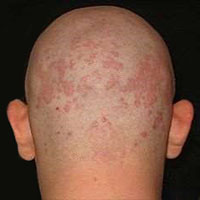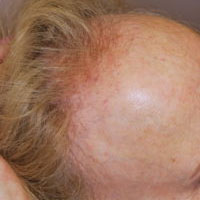
Experiencing scalp inflammation symptoms can be pretty annoying to say the least, but also embarrassing and sometimes painful. If your scalp is itchy, you have flakes of dandruff, red patches, or flakey patches, you may be suffering from seborrheic dermatitis, psoriasis, or scarring alopecia.
What’s Causing Scalp Inflammation?
There are a number of disorders that can be contributing to scalp inflammation and if left untreated can cause hair loss. The good news is, with proper diagnosis by a trained and experienced hair loss professional who can identify the specific source of the problem, some of these disorders can be remedied, as well as the resulting hair loss.
These disorders include:
 Seborrheic Dermatitis – also known as seborrhea, is a common skin condition that primarily affects your scalp. It causes stubborn dandruff and is a waxy, oily, scaly scalp skin condition with reddening associated with scalp irritation and inflammation.
Seborrheic Dermatitis – also known as seborrhea, is a common skin condition that primarily affects your scalp. It causes stubborn dandruff and is a waxy, oily, scaly scalp skin condition with reddening associated with scalp irritation and inflammation. Psoriasis – a skin condition in which skin cells build up and form scales and itchy, dry patches. There are various treatment options, but this condition cannot be cured. Psoriasis is thought to be an immune system problem. Triggers include infections, stress, and cold.
Psoriasis – a skin condition in which skin cells build up and form scales and itchy, dry patches. There are various treatment options, but this condition cannot be cured. Psoriasis is thought to be an immune system problem. Triggers include infections, stress, and cold. Scarring Alopecia – refers to a collection of hair loss disorders that destroy the hair follicle, replace it with scar tissue, and cause permanent hair loss. They are commonly misdiagnosed and can present with itch and inflammation.
Scarring Alopecia – refers to a collection of hair loss disorders that destroy the hair follicle, replace it with scar tissue, and cause permanent hair loss. They are commonly misdiagnosed and can present with itch and inflammation.Why Dandruff Occurs
The top layer of your scalp skin constantly sheds and renews itself. You usually don’t notice this because the cells shed one at a time. Inflammation of the scalp can cause cells to stick together. When you have large clumps of cells shedding, visible flakes may be seen on the shoulders, especially if you’re wearing dark clothing or on your scalp as the hair traps the scaling skin.
Itching Scalp
Itching scalp, with or without scaling, is very common. Some middle-aged people have itchy scalp for no obvious reason. The normal response is to scratch, but this could be the worst thing to do. Scratching oftentimes causes scratch marks and little crusty sores throughout the scalp. Sometimes, dandruff is the culprit for itching scalp. There are also a few less common skin conditions such as scarring alopecia that can present as itching in the scalp.
Scalp Ease is a great product for dry, itchy scalp. It’s a natural healing product that will reduce inflammation of the scalp, itching and dryness. It can be used daily and also after chemical treatments. Spray a small amount to the scalp, massage, and feel the product work its magic!
Scalp inflammation can be a sign of irritation or infection. It can also occur due to allergens on the scalp. The condition is usually local to certain parts of the scalp, but it can cause widespread breakouts. Usually, an inflamed scalp is accompanied by other signs and symptoms such as rashes, dry skin, itchiness and scaling. A healthcare provider such as a trichologist, can assist in diagnosing and treating individual causes of scalp inflammation.




